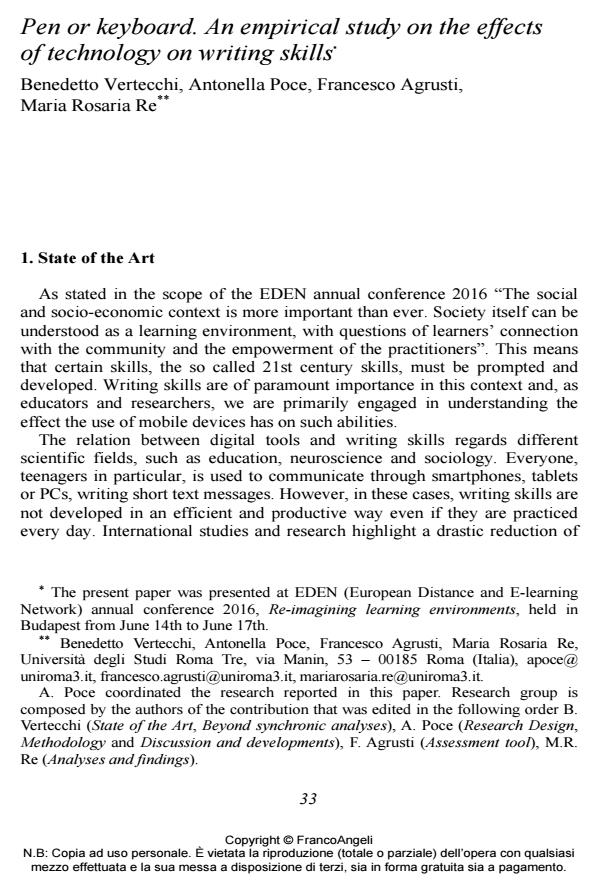Pen or keyboard. An empirical study on the effects of technology on writing skills
Titolo Rivista CADMO
Autori/Curatori Benedetto Vertecchi, Antonella Poce, Francesco Agrusti, Maria Rosaria Re
Anno di pubblicazione 2017 Fascicolo 2016/2
Lingua Inglese Numero pagine 12 P. 33-44 Dimensione file 163 KB
DOI 10.3280/CAD2016-002004
Il DOI è il codice a barre della proprietà intellettuale: per saperne di più
clicca qui
Qui sotto puoi vedere in anteprima la prima pagina di questo articolo.
Se questo articolo ti interessa, lo puoi acquistare (e scaricare in formato pdf) seguendo le facili indicazioni per acquistare il download credit. Acquista Download Credits per scaricare questo Articolo in formato PDF

FrancoAngeli è membro della Publishers International Linking Association, Inc (PILA), associazione indipendente e non profit per facilitare (attraverso i servizi tecnologici implementati da CrossRef.org) l’accesso degli studiosi ai contenuti digitali nelle pubblicazioni professionali e scientifiche.
The research reported in this article underlines the need to adopt a reflective attitude to the use of digital resources in teaching and learning. This relates to a growing body of research by different scholars in many countries. The present study underlines the need to adopt a reflective attitude to the use of digital resources in teaching and learning. The research starts from the assumption that students can develop their writing and critical thinking skills thanks to specific writing activities. Such activities regard the elaboration of short essays, both by hand and on computer keyboards, with the aim to highlight the difference in results. Within the paper, a specific assessment grid was outlined to evaluate students’ essays. Short essays written by students were produced in two different ways: by hand or keyboard. All data have been collected and analyzed to highlight the different results in skills development, according to the writing tool employed. From the analyses carried out and the results collected, handwritten short essays got higher scores than computer written texts: computer use in writing activities apparently reduces performances level in the majority of students taken into consideration.
Parole chiave:Writing skills, higher education, teaching evaluation, critical thinking, handwriting
- Digital transformation in higher education in Vietnam today Tran Mai Uoc, in Revista de Gestão e Secretariado (Management and Administrative Professional Review) /2023 pp.14582
DOI: 10.7769/gesec.v14i8.2699 - Cultural Awareness and Diversity Management in Contemporary Education Ayşe Erkaya, Esin Akyil, pp.301 (ISBN:9798337304021)
- A Review of Empirical Research on Second Language Writing: Pedagogical Applications and Future Directions 雅文 张, in Advances in Education /2025 pp.1091
DOI: 10.12677/ae.2025.1591779
Benedetto Vertecchi, Antonella Poce, Francesco Agrusti, Maria Rosaria Re, Pen or keyboard. An empirical study on the effects of technology on writing skills in "CADMO" 2/2016, pp 33-44, DOI: 10.3280/CAD2016-002004